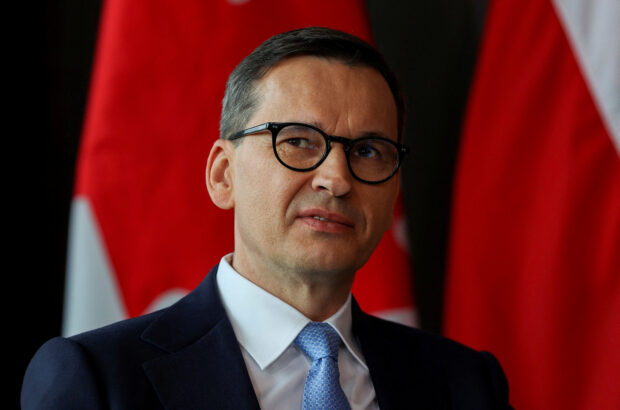
Polish Prime Minister Mateusz Morawiecki pictured at a meeting with Canadian Prime Minister Justin Trudeau (not pictured) in Toronto, Ontario, Canada, June 2, 2023. REUTERS FILE PHOTO
WARSAW — A group of a hundred soldiers from the Russian Wagner group have moved closer to the Belarusian city of Grodno near the Polish border, Polish Prime Minister Mateusz Morawiecki said on Saturday.
Poland, a former Warsaw Pact member which has been a full member of the U.S.-led NATO military alliance since 1999, has been concerned about the possible spillover of war on to its territory ever since Russian invaded Ukraine in February 2022.
Earlier this month, Poland began moving more than 1,000 troops to the east of the country amid rising concerns that the presence of Wagner fighters in Belarus could lead to increased tension on its border.
“The situation is getting increasingly dangerous … Most likely they (the Wagner personnel) will be disguised as the Belarusian border guard and help illegal migrants get to the Polish territory (and) destabilize Poland,” Morawiecki said at a press conference in Gliwice, western Poland.
“They will most likely try to enter Poland pretending to be illegal migrants and this poses additional threats,” Morawiecki said.
However he did not give the source of his information on the Wagner movements, and Anton Motolko, founder of the Belarusian opposition Hajun project which monitors military activity in the country, told Reuters his group had not seen any evidence of the Wagner group moving closer to Grodno.
The city has a potentially significant position given it is near the Suwalki Gap, a strategic strip of land along the Polish-Lithuanian border, which divides Belarus, Russia’s ally, from the Russian enclave of Kaliningrad.
Earlier in July, Wagner chief Yevgeny Prigozhin was shown in a video welcoming his fighters to Belarus, telling them they would take no further part in the Ukraine war for now but ordering them to gather their strength for Africa – where they are involved in a number of conflicts – while they train the Belarusian army.
The following day, some Wagner fighters arrived at the training ground of the 38th airborne assault brigade outside the city of Brest, just a few miles from the Polish border.
Wagner’s move to Belarus was part of a deal that ended the group’s mutiny attempt in June, when they took control of a Russian military headquarters, marched on Moscow and threatened to tip Russia into civil war, President Vladimir Putin has said.